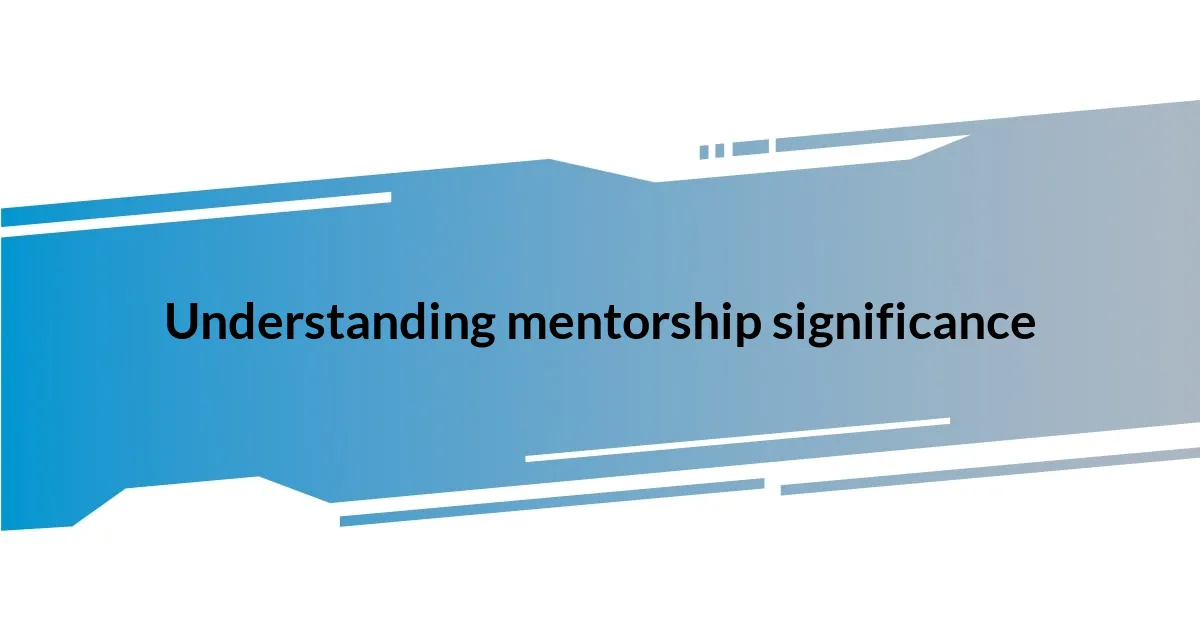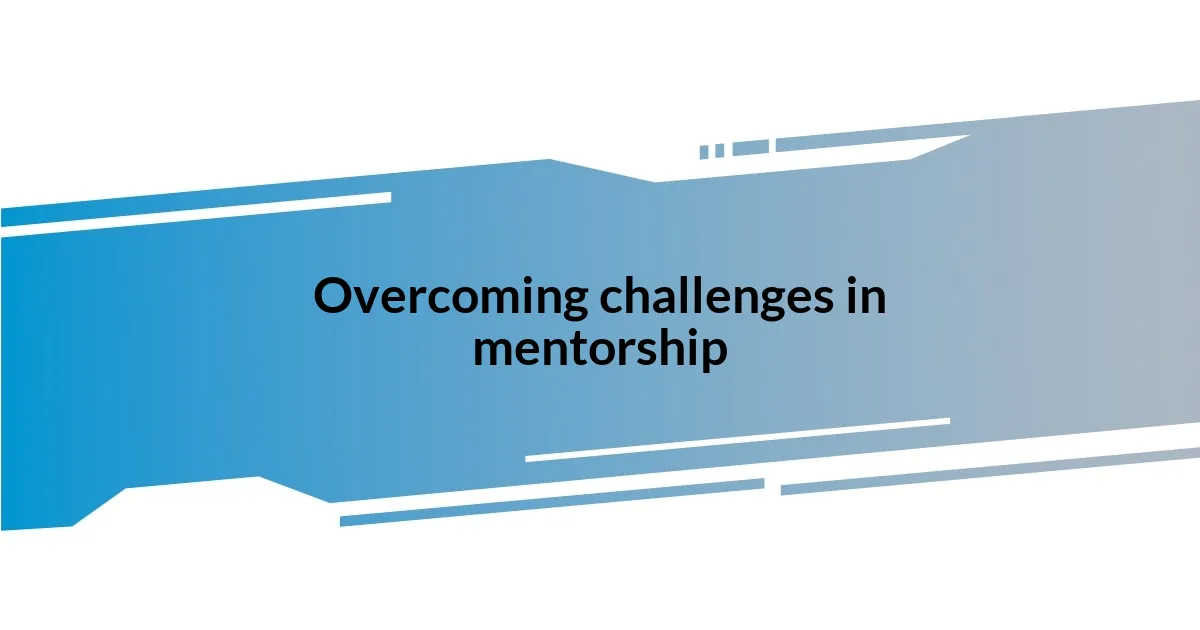Key takeaways:
- Mentorship enhances personal and professional growth by providing guidance, fostering community, and offering invaluable insights that can prevent costly mistakes.
- Key benefits of having a mentor include networking opportunities, gaining new perspectives, and receiving emotional support, which can significantly boost self-confidence.
- Building a successful mentor-mentee relationship requires open communication, setting clear goals, and maintaining consistency to strengthen the bond and ensure mutual investment in growth.

Understanding mentorship significance
Mentorship plays a crucial role in personal and professional growth. I remember my first mentor; she was a seasoned professional who took me under her wing. Her guidance not only helped me navigate challenges but also boosted my confidence. Have you ever had someone believe in you when you doubted yourself? That’s the power of mentorship.
The significance of mentorship extends beyond mere guidance. It fosters a sense of belonging and community. I often think of how my mentor made me feel like I was part of something larger than myself, a network of shared experiences and wisdom. This connection is vital, particularly in a world that can feel isolating, don’t you think?
Moreover, mentorship accelerates learning. The insights I gained from my mentor’s experiences were invaluable, often saving me from costly mistakes. Doesn’t it make sense to learn from someone who has walked the path before you? I find that this type of wisdom-sharing is not just beneficial; it’s transformative, shaping the way we approach our careers and aspirations.

Benefits of having a mentor
Having a mentor can significantly enhance your career trajectory. I can recall a pivotal moment when my mentor introduced me to key industry contacts. This opened doors I never even knew existed. It’s an eye-opening experience to realize how a single connection can change everything for you, isn’t it?
Another fantastic benefit is the perspective you gain from your mentor. I remember feeling overwhelmed by a challenging project, but my mentor helped me break it down into manageable steps, offering insights I hadn’t considered. It’s amazing how a different viewpoint can provide clarity and heighten your problem-solving skills, don’t you think?
Lastly, the emotional support a mentor provides is invaluable. There were days when self-doubt crept in, but my mentor’s encouragement pushed me to persevere. Their belief in my potential often made all the difference. The strength drawn from that relationship is something I cherish deeply.
| Benefit | Example |
|---|---|
| Networking Opportunities | Your mentor can introduce you to influential contacts, opening doors to new opportunities. |
| Broadened Perspective | Mentors can help break down complex challenges, providing insights that reduce overwhelm. |
| Emotional Support | A mentor’s encouragement can boost self-confidence and help reinforce your belief in yourself. |

Characteristics of effective mentors
Effective mentors embody a range of characteristics that enhance the mentoring experience. One particularly important trait is empathy; a good mentor understands their mentee’s struggles and aspirations. I can recall times when my mentor seemed to instinctively know when I was feeling overwhelmed, offering reassurance and understanding. This emotional connection fosters trust, making it easier to tackle difficult topics together.
Some key characteristics of effective mentors include:
- Empathy: Ability to understand and share feelings, creating a safe space for discussion.
- Experience: A wealth of knowledge from their own journey can provide valuable insights.
- Communication Skills: The ability to listen actively and convey ideas clearly enhances understanding.
- Commitment: Dedication to the mentee’s growth, investing time and energy into their success.
- Open-mindedness: Willingness to embrace diverse perspectives and ideas encourages innovation.
I also believe that adaptability is essential. In my experience, the best mentors are those who can adjust their approach based on the unique needs of their mentees. I remember my mentor switched gears from formal sessions to casual coffee chats when she sensed I needed a less structured environment. This flexibility allowed for more open conversations, providing insights that I didn’t even know I was searching for. The ability to pivot in response to a mentee’s needs really stands out as a crucial characteristic.

Building a successful mentor relationship
Creating a strong mentor-mentee relationship hinges on open communication. I vividly remember a time when I felt intimidated to voice my concerns about a project. Once I finally spoke up, my mentor responded with genuine interest, creating an atmosphere where I felt safe to express myself. Have you ever realized how much clarity comes from simply sharing your thoughts? It’s transformative.
Another essential aspect is setting clear goals together. Early in my mentorship, we took time to outline my aspirations and benchmarks. This joint effort not only aligned our expectations but also made me feel genuinely invested in my growth journey. It’s like having a roadmap; without it, how can you navigate your path effectively?
Lastly, consistency is key. I experienced this firsthand when my mentor made it a priority to connect regularly. Those check-ins didn’t just keep me accountable; they reinforced our bond over time. It’s reassuring to know someone is in your corner, isn’t it? Making that ongoing commitment can truly enhance the mentoring experience.

Overcoming challenges in mentorship
Overcoming challenges in mentorship often requires a delicate balance of patience and communication. I recall a rough patch with a mentee who seemed unmotivated, which left me feeling frustrated. It was only when I opened the dialogue and asked about their feelings that I discovered they were overwhelmed with personal issues. The realization hit me hard: sometimes, a mere willingness to listen can dismantle barriers that seem insurmountable.
Another area that can pose challenges is differing expectations. I’ve faced situations where my mentee and I didn’t see eye-to-eye on the goals we set together. After some honest discussions, we recalibrated our focus and came to a mutual understanding. Have you ever felt misaligned in a relationship? It can be disheartening, yet addressing it openly often brings renewed energy and clarity, transforming the experience into a joint venture rather than a one-sided journey.
Lastly, time management can really throw a wrench in the works. I found myself juggling multiple commitments, and it affected my availability for mentoring. During one session, I apologized for being late, and my mentee surprised me by saying they appreciated my honesty. That candid moment taught me the importance of acknowledging limitations and being transparent. Isn’t it funny how such small interactions can strengthen a bond even amid challenges? Embracing these hurdles, rather than shying away from them, paves the way for deeper relationships in mentorship.

Sharing your mentorship experience
Sharing my mentorship experience has always felt like examining a treasure chest filled with valuable insights. I remember a specific instance when I had the opportunity to mentor a young professional who was eager yet unsure of their path. During our sessions, I encouraged them to share their fears openly, and it was eye-opening to see how just expressing those worries made them feel lighter, almost like shedding a weight they didn’t realize they were carrying. Isn’t it incredible how vulnerability can create such connections?
I’ve also found that sharing stories about my own mentoring journey resonates deeply with mentees. One time, I recounted a struggle I faced early in my career—a pivotal moment when I failed an important presentation. The look on my mentee’s face as they absorbed that story was priceless; they realized that everyone encounters setbacks. Have you ever shared a failure that sparked a true breakthrough in someone else? It reinforced the notion that mentorship is as much about the journey as it is about the destination.
In my experience, reflecting on shared successes is equally vital. Celebrating the milestones, no matter how small, can invigorate the mentorship dynamic. I recall a particularly rewarding moment when my mentee landed their first major client after weeks of hard work. We took time to reflect on that achievement together, and the joy was palpable. This celebration not only marked their success but also strengthened our bond. How often do we halt to appreciate our progress along the way? Sharing these experiences creates a rich tapestry that makes mentorship memorable and meaningful.
